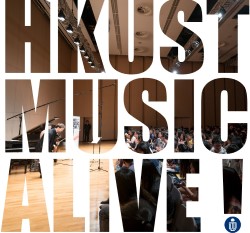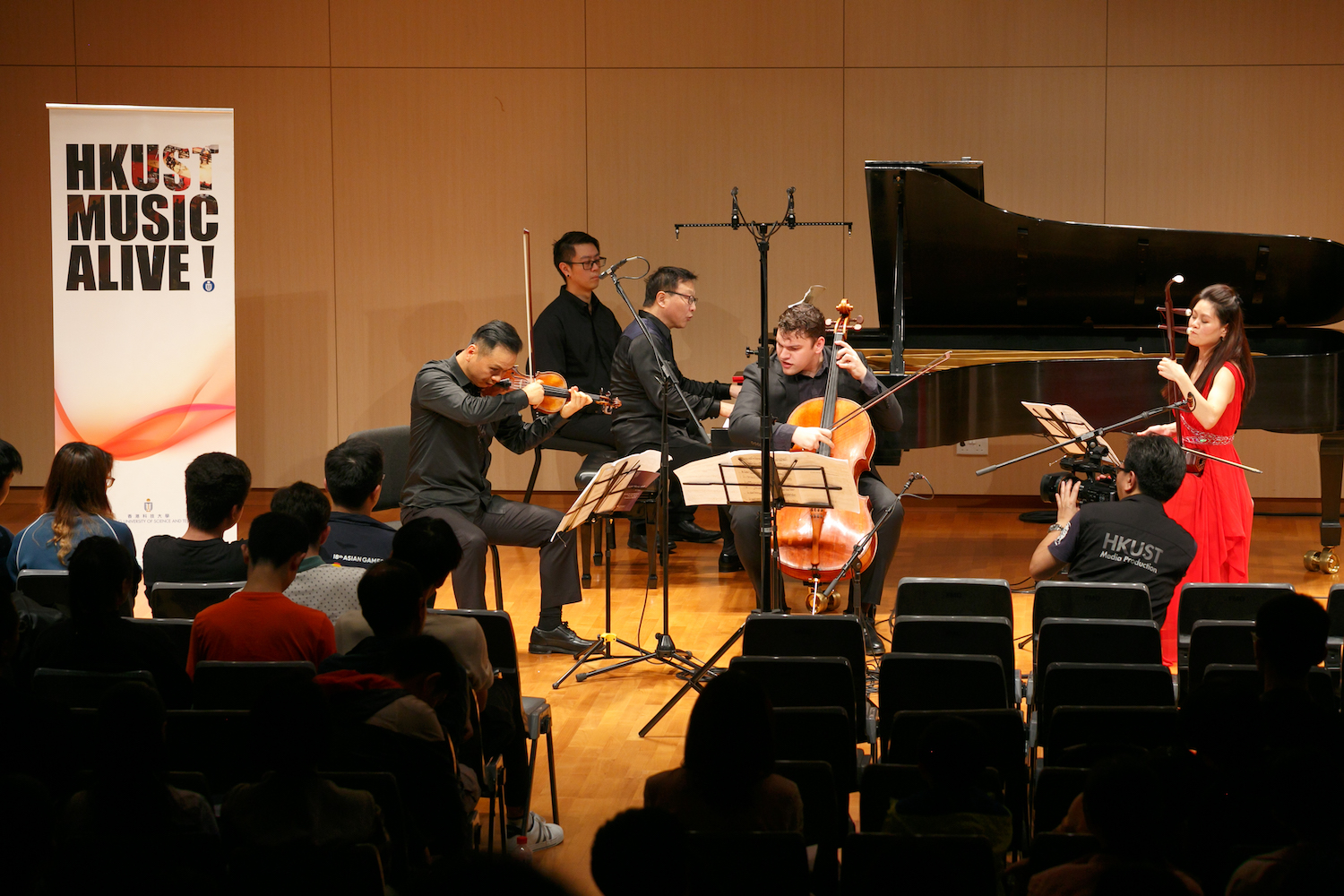Date: 15 November 2018 (Thursday)
Time: 8:00pm
Venue: CMA Lecture Theater (LTL), Cheng Yu Tung Building, HKUST
Bright Sheng, composer and piano
Matthew Brower, Pianist, piano
Xiang Gao, violin
Cathy Yang, erhu
Special Guest:
Gabriel Cabezas, violoncello
Program
Gang Chen (arr. 6-wire)
Sunshine Over The Tashikuergan Desert
Wei Zhou
The Grapes Are Ripe for erhu and piano (Chinese folksong)
Edgar Grieg
Sonata for violin and piano in C minor (mvt. 1)
Gao and Yang
Sixth Sense for 6-wire & violoncello
Vittorio Monti
Czardas
Astor Piazzolla (arr. Xiang Gao)
Libertango
Bright Sheng
Clearwater Rhapsody for erhu, violin, violoncello and piano
(Asian Premiere)
Program Note
Bright Sheng
Clearwater Rhapsody for erhu, violin, violoncello and piano
(Asian Premiere)
Clearwater Rhapsody was commissioned by 6-Wire (Xiang Gao, Violin; Cathy Yang, Erhu; Mathew Brower, Piano), Ensemble-in-Residence at University of Delaware, USA. The work is premiered on November 3rd, 2018, at University of Delaware, Cathy Yang-erhu, Xiang Gao-violin, Julian Schwarz-violoncello, Bright Sheng-piano. Subsequent performances take place on November 14, 2018, at Hong Kong University of Science and Technology, Hong Kong; and on February 16th, 2019, at Zankel Hall of Carnegie Hall, New York City.
The inspiration of the composition has two folds. I have known Xiang Gao for over 23 years, when I first started teaching at University of Michigan, where he was a star student. Over the years, I have been even more impressed by his musical and artistic achievements, not least his attempt to bridge musical cultures from both sides of the Pacific Ocean. I was also captivated by the virtuoso playing of the innovative 6-Wire—the total number of strings of the Chinese erhu and Western violin.
The erhu (literally, two-string fiddle) was originally brought into China from Central Asia through the Silk Road era. Across centuries, not only it has authenticated a distinctive Chinese character, but also a soloistic nature especially when performed with a Western music ensemble. In Clearwater Rhapsody, I try to highlight the difference between the erhu and the piano trio, hoping the timbre and pitch discrepancy would make a strong solidarity of this work.
Besides my appointment at UM, where I am the Leonard Bernstein Distinguished University Professor of Music Composition, since 2010 I have had a visiting position at the Hong Kong University of Science and Technology, first as the Y. K. Pao Distinguished Visiting Professor of Humanities, then as the Anna Pao and Helmut Sohmen Professor-at-Large, a joint appointment by the university’s Institute for the Advanced Studies and the School of Humanities and Social Science. I have been very touched by the university’s strong commitment and support to provide its students of science and technology with first-rate arts education.
My position at HKUST also afforded me being truly inspirational by the breath-taking view of Hong Kong’s Clearwater Bay from my corner office on top of a hill, where I compose and prepare concerts in late spring and early summer each year. Looking over this part of the Pacific Ocean, I always marveled by its beauty and serenity attained within only a few miles from Hong Kong’s business districts, one of the most exciting metropolises in the world. This contrast and co-existence of opposite characters is very much in my mind when I conceived Clearwater Rhapsody.
Biography
6-wire
6-wire is inspired by the historical connection between the erhu, the Chinese 2- stringed violin, and the 4-stringed violin – both essential leading instruments in the East and West. A Chamber Music America grantee with unique instrumentation, the Delaware-based 6-wire piano trio is a site-specific, pioneering American ensemble that mixes traditional romanticism and virtuosity with new chamber music. The three virtuosi celebrate diversity in performance, weave stories and context into their concerts, and transform how live instrumental music is experienced.
Ensemble in residence at the University of Delaware since 2010, 6-wire performs internationally for chamber music and university concert series, community lecture recitals, and large outdoor and TV events, fulfilling its mission to promote cultural exchange while attracting new chamber music audiences and supporters with new repertoire and sounds from around the world. Founded and directed by Chinese-American violinist Xiang Gao, an award- winning concert presenter, composer, and producer, 6-wire’s electrifying performances redefine traditional chamber music as a “wildcard” ensemble delightfully surprising cross-generational audiences with forward-looking compositions and cutting-edge audio and video technology.
6-wire has commissioned several new works by leading contemporary composers for major events around the world. The group recently toured China, performing Mark Hagerty’s new concerto for 6-wire and percussion with Israeli percussionist Chen Zimbalista in several major concert halls including Shanghai Oriental Art Center. They will be performing Bright Sheng’s new piano quartet for 6-wire and cello in Hong Kong this November (world premiere) and in their upcoming Carnegie Hall debut in February, where they will also perform a new work for 6-wire and the University of Delaware Chorale written by Jennifer Barker.
While mostly performing on acoustic instruments, 6-wire features their own wireless sound system and the circular PianoArc seen during Lady Gaga’s Super Bowl halftime show for select concert venues. Program offerings for the following season include compositions by Sarasate, Brahms, Dvořák, Gershwin, Piazzolla, William Bolcom, Bright Sheng, Mark Hagerty, Xiang Gao, and more. 6-wire also collaborates with many Grammy-winning musicians, theatre actors and visual artists.
Grammy-winning sound engineer Andreas Meyer produced 6-wire piano trio’s new 6th Sense album.
Gabriel Cabezas
Cellist Gabriel Cabezas has appeared as soloist with America’s finest orchestras, including those of Philadelphia, Chicago, Cleveland, New York, Los Angeles, Detroit, Houston, Pittsburgh and Nashville. An enthusiastic chamber musician as well as soloist, Gabriel has performed and toured with artists ranging from bassist Edgar Meyer to songwriter Gabriel Kahane to the musicians of the Marlboro Festival. He is a member of the New York sextet yMusic, hailed by NPR’s Fred Child as “one of the groups that has really helped to shape the future of classical music”. Their virtuosic execution and unique configuration (string trio, flute, clarinet, and trumpet) has attracted the attention of high profile collaborators – from Dirty Projectors to Paul Simon – and more recently inspired an expanding repertoire of original works by some of today’s foremost composers. Cabezas is also a co-founder of new music and contemporary dance collective Duende, which focuses on the interaction between performers and dancers in the live realization of new scores. His first full length album, a recording of Benjamin Britten’s Cello Suites, was recently released on PEOPLE, a new collaborative online streaming platform by Bon Iver’s Justin Vernon and The National’s Aaron Dessner. In 2016, Gabriel received the Sphinx Medal of Excellence, a career grant awarded to emerging classical artists of color, who, early in their professional career, demonstrate artistic excellence, outstanding work ethic, a spirit of determination, and ongoing commitment to leadership. In addition, he is a winner of Astral Artists’ 2014 National Auditions and is a member of their roster of musicians. Cabezas studied at the Curtis Institute of Music under Carter Brey.

